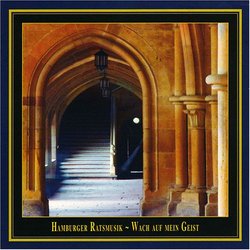| All Artists: Johann Schop, Gottfried Tielke, Christoph Bernhard, August Kuhnel, Christian Herwich, Johann Rist, Hamburg Ratsmusik, Ulrich Wedemeier, Klaus Mertens, Simone Eckert Title: Awake My Spirit - Works from the Appendix to the "Dresden Gesangbuch" of 1649 and Johann Rist's "Himlische Lieder" (Lüneburg in 1641/2) Members Wishing: 2 Total Copies: 0 Label: K&K Verlagsanstalt Original Release Date: 1/1/2007 Re-Release Date: 6/26/2007 Album Type: Import Genres: Dance & Electronic, Special Interest, Pop, Classical Styles: Vocal Pop, Opera & Classical Vocal, Chamber Music, Historical Periods, Baroque (c.1600-1750), Classical (c.1770-1830) Number of Discs: 1 SwapaCD Credits: 1 UPCs: 675754998226, 4260005910483, 669910669761 |
Search - Johann Schop, Gottfried Tielke, Christoph Bernhard :: Awake My Spirit - Works from the Appendix to the "Dresden Gesangbuch" of 1649 and Johann Rist's "Himlische Lieder" (Lüneburg in 1641/2)
 | Johann Schop, Gottfried Tielke, Christoph Bernhard Awake My Spirit - Works from the Appendix to the "Dresden Gesangbuch" of 1649 and Johann Rist's "Himlische Lieder" (Lüneburg in 1641/2) Genres: Dance & Electronic, Special Interest, Pop, Classical
"Who would ever have thought it... in a highly appealing, even noble way, this Hamburg Ratsmusik performance encourages us to take a look at certain values that appear to be losing their merit more and more today due to... more » |
Larger Image |
CD Details
Synopsis
Album Description
"Who would ever have thought it... in a highly appealing, even noble way, this Hamburg Ratsmusik performance encourages us to take a look at certain values that appear to be losing their merit more and more today due to the wide influence of our environment. Listening to this concert, it is touching and, indeed, perhaps even comforting for us to discover values like grace, humility and noble-mindedness, which in those days were as important as efficiency, effectiveness and achievement are today. For me personally, this is one of the most beautiful and appealing chamber music concerts in the entire Maulbronn Monastery series." (Josef-Stefan Kindler, K&K Verlagsanstalt) The "Hundert ahnmutig und sonderbar Geistliche Arien" (One hundred charming and especially religious airs), printed in Dresden in 1694, tell of the breath of God as symbolised by the winds Africus and Caurus and of "the silken soft West that leaves its kisses on the roses". This collection is an appendix to the Dresden Gesangbuch and appeared 18 years after the latter; its editor, the composer Christoph Bernhard, did not live to see it in print. The songs were not meant to be sung by the parish congregation - a delicate subject anyway during the tense times of Augustus the Strong's conversion to Catholicism. They were for the private Protestant religious services of the other members of the Royal Family. The melodies are more elaborate than those usual in other ecclesiastical music of the time, the bass parts are highly imaginative and the individual ritornellos are remarkable. There is another collection of 17th century songs that is dedicated to the same theme - Johann Rist's "Himlische Lieder" printed in Lüneburg in 1641/2 and set to music by Johann Schop, the Hamburg City "Rath" (or Council) musician. Both men were friends of Christoph Bernhard, who used his connections as a favourite pupil of Heinrich Schützen to arrange for them to meet the famous Kapellmeister on his journey up to Copenhagen.

 Track Listings (18) - Disc #1
Track Listings (18) - Disc #1